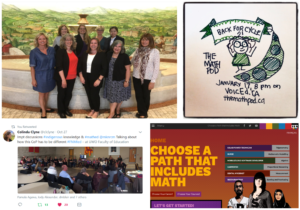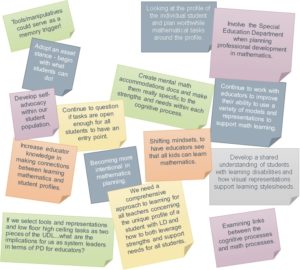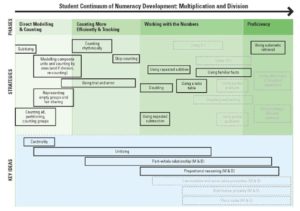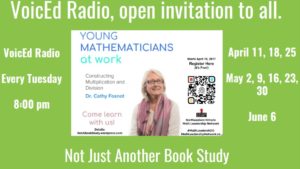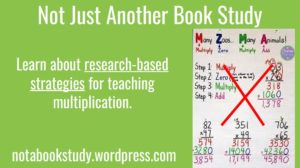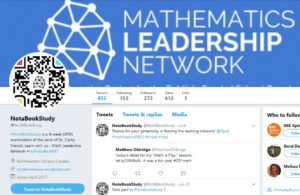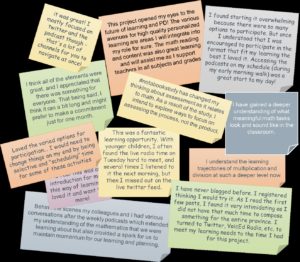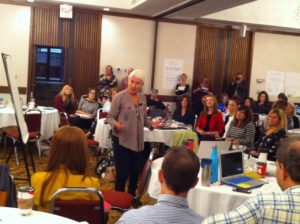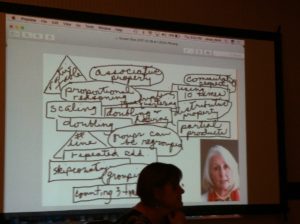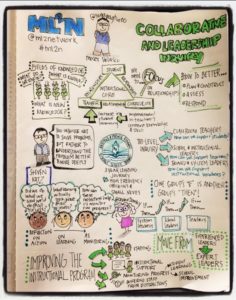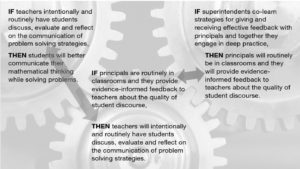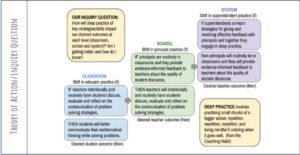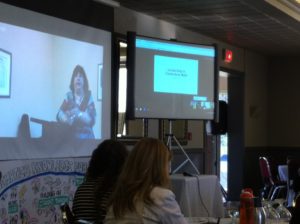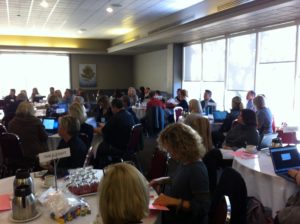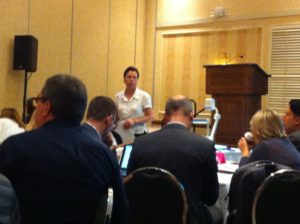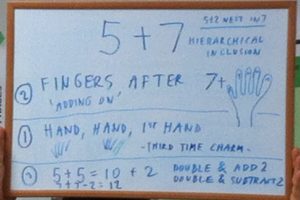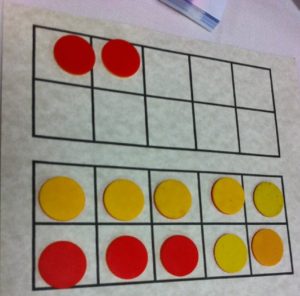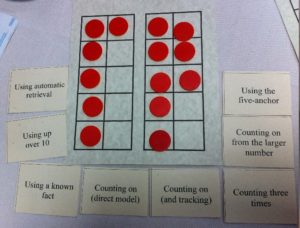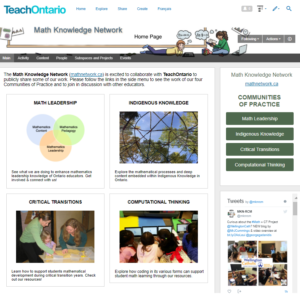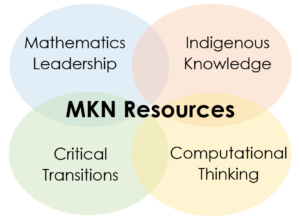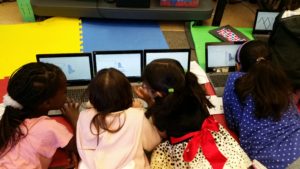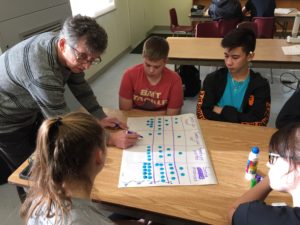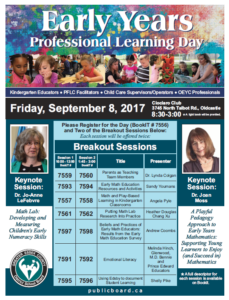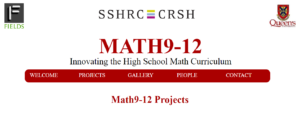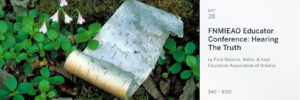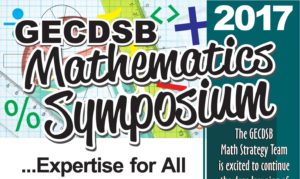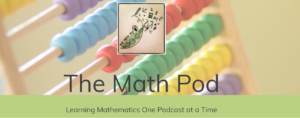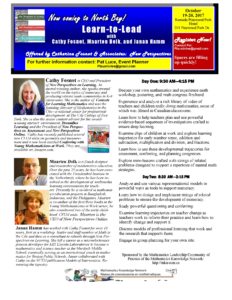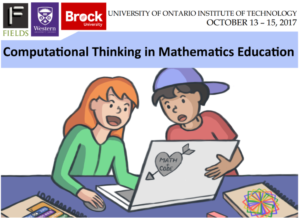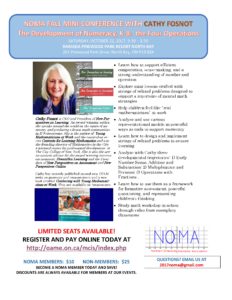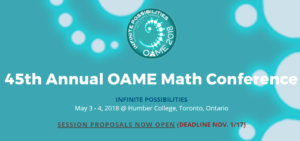by Dragana Martinovic
Excerpts from selected workshops and PD meetings
In the first year of the Mathematics Leadership Community of Practice existence, our member networks encompassed North East (MLN), North West (NWML2N), and Central Ontario (ML2N). In this blog, we report from some meetings organized from April to October 2017.
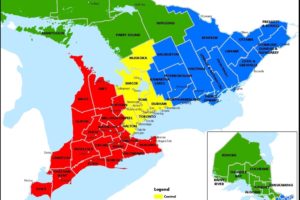

MLN April 2017 meeting
This meeting presented the start of the Phase 2 of the MLN work. The learning goals for this three-day face-to-face session held in Sudbury were:
- Continue to ‘construct’ and build relationships, within and beyond the leadership network.
- Understand and be able to implement the conditions necessary for monitoring our actions.
- Deepen understanding of the relationship between content and pedagogy, with a lens on multiplication and division.
- Consider how Hattie’s research informs our thinking and planning.
- Make connections between all the facets of learning in the MLN–the interconnectedness of everything we are learning and doing.
The sessions included Connie Quadrini, Student Achievement Officer, who talked about: (a) specialized and horizon content knowledge (using Deborah Ball’s framework for Mathematics Knowledge for Teaching) and (b) supporting curriculum connections for students (see a depiction of multiplication across the grades). Connie provided a focus on students with learning disabilities, a topic of particular interest for the MLN educators.
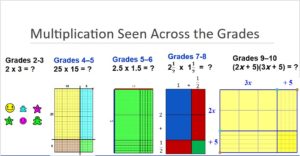
The MLN participants reflected on the question: “How might your learning from today further support students with learning disabilities, in mathematics within your board/school?” and also worked on connecting student thinking to the Lawson Continuum.
The educators worked on the balance of surface, deep, and transfer learning, emphasizing the need to attend to all three, where (surface – how) –may require direct instruction, thinking (deep – why) – requires talk, and constructing (transfer – apply) – requires reflection. Surface may have negative connotation; most teaching is surface. “Too often learning ends at the surface level. But the challenge is this: we can’t over-correct in the other direction, bypassing the foundational knowledge in favour of critical and analytic thinking” (Hattie, 2012, p.131). The MLN facilitators’ team also introduced aspects of the whole school inquiry, which will be a main monitoring tool in the next two Phases.
Timeline for MLN’s Phase 2 Activities
- April MLN: An overview of Whole School Assessment Approach: Connecting Assessment, Responding, and Monitoring
- In-between April and July MLN: Board teams determine context for learning:
- What mathematics will we monitor (a big idea that spans the grades)?
- Which learners will we monitor (a school or division)?
- Which educators will we approach to co-learn through this process?
- What resources do we have (need) to support the development of the assessment?
- Mid-May: Schedule virtual meeting with field team to discuss plan.
- Mid-June: Share content focus with Field Team.
- July MLN: Collaboratively develop and/or refine assessment tool to be used for monitoring in each board.
- In between July and September MLN: Implement the assessment in first few weeks of September.
- September MLN: Collaborative analysis of assessment data; consider next steps in implementation process.
- In between September and December MLN: Implement and monitor; post-assessment.
- This process will continue through MLN phase three.
MLN’s Not a Book Study: Open Online Professional Learning
The MLN team also spearheaded this open online professional learning opportunity focused on Dr. Cathy Fosnot’s work specific to multiplication and division. More than 500 educators across Ontario registered. .Beginning on April 10, they were able to interact, network and share thinking with other educators on various open online platforms. Through VoicED Radio, Dr. Fosnot has weekly guided this learning.
432 Tweets were posted on the #notabookstudy Twitter account. 105,707 accounts were reached, which presents an admirable size for audience involved in a Not a Book Study conversation. A total of 266,873 views of a Not a Book Study conversation were recorded. The MLN team conducted a survey asking educators who participated in the Not a Book Study professional learning to provide their feedback. This is what they responded:
Scaling it up! Cathy Fosnot in North Bay
In continuation with previous work, in October, Cathy Fosnot visited the North Ontario region. First, for several days, she worked with individual boards, then she ran a 2-day Leadership Institute in North Bay, and concluded this working visit, with a NOMA event. The Leadership Institute was supported by the Mathematics Leadership Community of Practice. It was attended by 100 educators in leadership positions, including 20 Ministry staff. Three educators from the GECDSB (one Consultant and two Principals) also attended the Institute. Cathy said: “What is happening in Ontario is incredible!”
When talking about ways to support teachers in learning, how to assess the learning in the moment, and how to craft an assessment, she said: “We found that teachers focus on pedagogy, not on mathematics.” The NOMA event had 85 participants. This professional learning for teachers was organized in support of efficient computation, sense-making, and a strong understanding of number and operation.
The MLN has just started its Third Phase. More reports to follow!

The ML2N supports all educators in the Barrie region to:
- improve leadership content knowledge in mathematics (knowledge/skills)
- know what strong instruction looks like in mathematics (awareness)
- encourage strong instruction when it is not evident (behavior/action)
- create a culture of learning (social & emotional conditions)
- facilitate effective collaborative inquiry (behavior, action, decision-making)
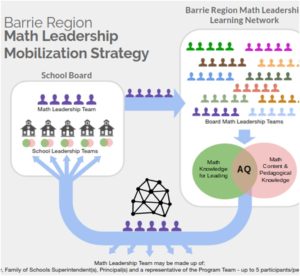
First day of the July meeting was dedicated to mathematics knowledge for teaching and leading, and monitoring for impact. On the second day, Moses Velasco (Education Officer), gave a session on the professional inquiry. Moses touched the following themes:
- Why inquiry as an approach to professional learning?
- What constitutes a leadership inquiry?
- How might a leadership inquiry be monitored?
- How can we begin developing a leadership inquiry?
Moses said: “Professional learning demands that teachers think critically about their practices and figure out what needs to change to benefit their students’ learning. Professional development always hoped and strived for instructional change but professional learning ensures and plans for change.” He used an example from a three-level inquiry at HPEDSB, where one person’s “if” became another person’s “then.” See how Debbie Donsky visualized this session and one of the slides from Moses’ session:
Scaling it up! Marian Small in Thunder Bay
On October 18 2017, the two leadership networks connected through Skype to share learning. Dr. Marian Small spent two days with NWML2N in Thunder Bay and during the first day session, the ML2N educators participated online (see pictures below). Marian Small talked about leadership in elementary mathematics. She said about leadership: “You cannot delegate this if you are a principal or school leader. You must get in there….You must make a math change a singular focus and a very visible focus.”
Scaling it up! Alex Lawson in Toronto
In September and October, Dr. Lawson facilitated sessions for the leadership networks’ teams. She talked about learning trajectories in relation to mathematical operations. The educators participated in discussions, solved mathematics problems, and watched videos that demonstrated mathematical development of Gr. 1 – 5 children. See what strategies different groups of educators suggested for children to solve 5+7 = ?, if they do not know it as a fact:
The image on the right presents different strategies from the continuum when solving 6+8=?. What can teachers do to help children move along the continuum? “A lot!” says Lawson, “We can introduce mathematical models that help children to construct mathematical understanding.” The premise of her talks was that “Just memorizing the [mathematical] facts is no longer enough and it never was.”
This blog post was written by Dr. Dragana Martinovic, co-Lead of the Mathematics Leadership CoP and Professor of Mathematics Education at the University of Windsor.
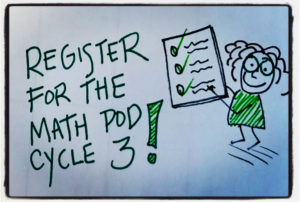 Cycle 3 of The Math Pod begins tonight (April 4th) at 8 p.m. This time around, the theme is “Arithmetic to Algebra: Looking for the Powerful Moments, K-8.” Cathy Fosnot will be opening up her online platform, P2S2, for the month of April and will be running an online Professional Learning Community (PLC) to accompany the weekly radio show on VoicEd Radio. Learn more and register here!
Cycle 3 of The Math Pod begins tonight (April 4th) at 8 p.m. This time around, the theme is “Arithmetic to Algebra: Looking for the Powerful Moments, K-8.” Cathy Fosnot will be opening up her online platform, P2S2, for the month of April and will be running an online Professional Learning Community (PLC) to accompany the weekly radio show on VoicEd Radio. Learn more and register here!

